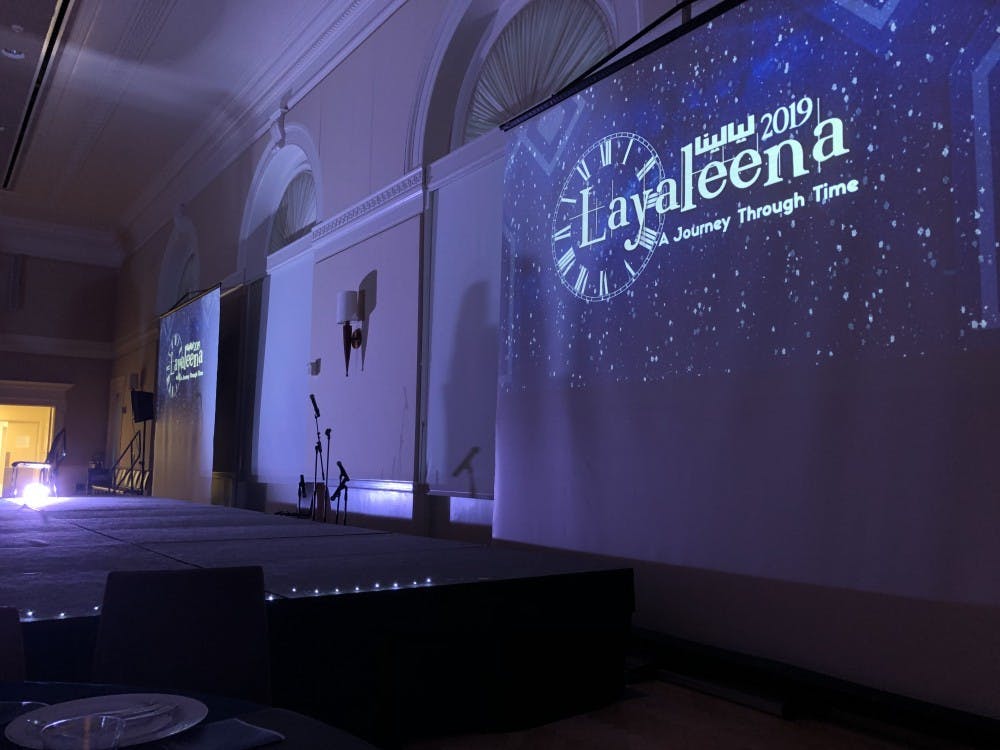For centuries in Arab cultures, families have gathered together at night and admired art in its vast array of forms — dance, poetry, song and instrumentation. These collective experiences are, in Arabic, called “Layaleena” — “our nights.”
This sense of gathering for shared appreciation of art and culture was palpable last Thursday when over 100 people gathered in Newcomb Ballroom to celebrate the Arab Student Organization’s Layaleena event. For the eighth year in a row, Layaleena featured a variety of student performances such as singing and dancing, poetry reading, violin-playing and comedic skits depicting everyday life in the Arab world. Catered by Afghan Kabob, the event also featured trivia questions about Arab culture and ended with the opening of the stage into a dance floor where members of the audience were invited to dance to popular Arabic songs.
“[Layaleena] is a showcase of … Arab culture through different performances,” said Hisham Ahmad, second-year College student and ASO president. “It’s also a celebration … where Arabs get to meet together and celebrate their culture, and at the same time, non-Arabs will come and learn more about the culture.”
The theme for Layaleena this year was “A Journey through Time,” which, according to Ahmad, represents a celebration of how Arab culture has changed over the years, as well as the aspects that have remained the same.
“When I was discussing [the theme] with my [executive] members, we really wanted to dive back through the past just to show our culture,” Ahmad said. “Because our culture [has] changed throughout time.”
This idea of cultural evolution and cultural persistence was present in every performance within the program. Layaleena opened with a video playing a mashup of popular Arabic songs from the year 1900 to present day.
This video was followed by a comedic skit depicting a typical mother-son relationship in the Arab world. Featuring the event’s emcees, second-year College student Habiba Elnagdy and second-year Engineering student Karim Shoorbajee, the skit portrayed a comical interaction between a lazy teenager content on sitting around the house and playing video games and his impatient mother, tirelessly completing housework around her son — fitting with the event’s theme.
“We … wanted to show that relationship and how it’s never changing, like whether it’s today or … 30 years ago,” Ahmad said.
The “A Journey Through Time” theme appeared in unique ways in each of the different performances. The music for the traditional belly-dancing act, which featured five female dancers, included Arabic songs from both the 1960s and the early 2000s. In the performance “A Journey through Palestinian Memories,” second-year Engineering student Annisa Elbedour played the violin in front of a large screen that displayed a montage of black-and-white photos of her ancestors in Palestine in the 1970s.
Other highlights included a performance of the traditional Middle-Eastern Dabke dance — which began with three male and three female dancers and eventually welcomed audience members to the stage — and a reading of the original poem “A Poem for Palestine” by first-year College student Serene Ghul.
The emotional poem addressed the long-time Israel-Palestine conflict and paid tribute to those Palestinians whose lives have been lost over the years.
“I wrote the poem about three or four years ago,” Ghul said. “I specifically wrote it at that time … because my grandfather had … published a book about the conflict, and I had been learning a lot more about [it] through my father and my grandfather.”
Thursday night was the culmination of preparations that started from last semester. It was an event that, according to Ahmad Hasanian — second-year College student and ASO executive coordinator — provided valuable cultural experiences for both performers and attendees.
“What makes [Layaleena] really special to me is [that] underrepresented cultures in general a lot of times feel forgotten, especially at the University level,” Hasanian said. “So this event really gives people a chance … to represent their culture and embrace it and be proud of it, while at the same time educating others about the culture and making for a more diverse community on Grounds.”







